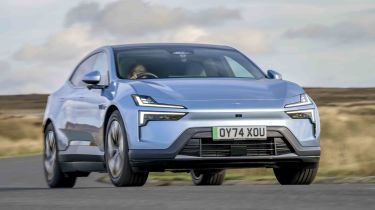Electric car tax explained: how much will your EV cost you in tax?
New tax rates from April 2025 have added hundreds of pounds to the cost of running an EV in the UK

While saving the planet is one of the main reasons people have historically bought EVs, the main incentive has undoubtedly been the financial savings they’ve long incurred. From government grants to Vehicle Excise Duty (VED) exemptions and reduced company car tax rates, the benefits enjoyed by EVs have slowly dropped off as electric cars continue toward becoming the norm, rather than the exception.
Now, as of April 2025, electric cars attract VED just like any other car. There's no significant saving after the first year either, because new EV buyers are also subjected to the full brunt of the expensive car supplement, which adds hundreds to your road tax bill in the years following first registration.
The tax increases come at a time where advocates and car manufacturers alike are already concerned by a slowdown in electric vehicle sales among private buyers in particular, as the Government ramps up sales targets for EVs ahead of its 2030 ban on the sale of petrol and diesel vehicles.
Below we look at the different taxes that electric cars are now subjected to and which EVs have been the hardest hit.
What taxes do electric cars attract?
As of April 2025, electric cars are now subject to all the same taxes as their combustion counterparts, just at different rates depending on the age of the car, and whether it’s privately owned or being run as a company car.
For private buyers, the most significant tax is Vehicle Excise Duty, also known as VED, car tax, or simply ‘road tax’. This must be paid when a vehicle is first registered, and annually thereafter. Electric vehicles costing more than £40,000 also now attract the expensive vehicle supplement, which currently stands at £425 annually between years two and six of ownership.
Company buyers will be familiar with Benefit-in-Kind or BiK taxation, and this has applied to EVs for many years, albeit at a much lower rate than for cars with tailpipe CO2 emissions. Finally, all cars, electric or otherwise, are subject to Value Added Tax, or VAT, at the point of sale.
Vehicle Excise Duty
Vehicle Excise Duty (VED), commonly known as road tax, will be familiar to anyone who’s owned a new or used vehicle. It’s an annual fee payable from the moment a car is registered, and every year thereafter when a vehicle is kept on the road.
That is, unless you bought an electric car, because these have previously been exempt from all VED charges, both at first registration and in subsequent years. From April 2025 that changed, with new rules affecting both new and older EVs.
New electric cars are now subject to a tax charge of £10 in the first year, which will be hardly noticed by most buyers. A tougher pill to swallow is that EVs now also attract the standard annual rate of VED, which currently stands at £195 – not to mention that those costing more than £40,000 are also subject to the expensive car supplement (see below).
If you own an EV registered between 1 April 2017 and 31 March 2025 and have been benefitting from zero road tax, the bad news is that from April 2025 your car also becomes liable for the £195 standard annual rate. If you have an EV that was registered prior to 31 March 2017, you’ll also lose your zero-rated road tax, but will only have to pay VED at £20 per year from April 2025.
VED luxury car supplement
As well as getting a free pass on road tax, EVs were previously exempt from the expensive car supplement applied to other models that cost more than £40,000. For anyone buying a new EV from now, this will be the most significant tax increase they’ll face under the new regime.
The supplement now sits at £425 a year and applies for five years from the car’s second birthday, that is years two to six. So EVs that would previously have been free to tax will now cost private buyers £620 per year from year two onwards. This is because they’ll pay the £425 surcharge on top of the standard £195 annual rate.
It’s not a small number of vehicles that will be affected, either, because EVs tend to be quite expensive brand new. Given the range starts at more than £39,500, most Volkswagen ID.4s will attract this new higher tax rate for instance – and that’s just a sensible electric SUV, not something most people would consider a luxury car. In fact, data from the UK’s Society of Motor Manufacturers and Traders (SMMT) estimates that this will impact seven in 10 EVs sold.
This is worth bearing in mind for used-car buyers, too. It’s not always easy to find out what the used model you’re buying cost when it was brand new, so it’s worth running a car’s registration through an online car tax calculator to see how much VED might cost in advance.
Owners of EVs worth more than £40,000 registered before April 2025 will at least be spared from paying the expensive-car supplement – although, of course, they’ll still now have to pay the standard £195 annual rate.
Benefit-in-Kind
With their employer footing the bill for road tax, the cost company-car users are most concerned by is Benefit-in-Kind taxation, abbreviated to BiK. This works out a tax rate based on three factors: the cost of the car, whether you’re a lower or higher-rate taxpayer (i.e. pay tax at the standard 20 per cent rate, or the higher 40 per cent rate of income tax), and a BiK percentage rate.
This latter figure has been two per cent for EVs for a few years now, but has now increased to three per cent. This obviously means it’ll cost a little more in tax to run a company car, but given this rate is already far lower than for cars with higher CO2 ratings, running an EV as a company car is still incredibly cost-effective – the difference between a petrol BMW 3 Series and an electric BMW i4, for instance, is measured in the thousands of pounds.
VAT
Most things you buy or services you use in the UK attract Value Added Tax, or VAT, typically at a rate of 20 per cent. If a car costs £20,000 before VAT, then the on-the-road price (ignoring registration costs and other peripheral car-buying expenses) will be £24,000.
Some products and services are exempt from VAT – most food and drink (excluding sweets, alcohol, soft drinks and the like), sports activities, gambling, most healthcare products and education are either exempt or zero rate, while things such as domestic energy and heating products are subject to a much lower five per cent rate.
Electric cars get neither exemption, nor a lower rate, so are currently subject to the full 20 per cent whack, just the same as any other car whatever its power source. However, there is an interesting VAT variation for EV drivers when it comes to charging costs: those drivers with home chargers use ‘domestic’ energy VAT rated at five per cent, while anyone using public charging has to pay the standard 20 per cent VAT rate.
There’s currently a push from within the industry to rate public charging VAT at five per cent, and to reduce VAT on EV purchases to encourage their adoption. Both the SMMT and some car company executives have called for VAT to be halved, cutting the up-front cost of EVs by thousands of pounds (the SMMT estimates around £4,000 on average).
With EVs now being subject to higher VED costs, we’re sure to see renewed interest in trying to slash their cost in other ways in order to incentivise adoption, and VAT does appear to be one of the more obvious ways of doing this. However, it’s unlikely to be popular with the Government as it tries to balance the public purse, especially with the prospect of falling tax revenues from petrol and diesel as more EVs hit the road.
Our Car Tax Checker tool lets you check your tax status and renewal date in seconds. Check your VED car tax now...
Find a car with the experts








